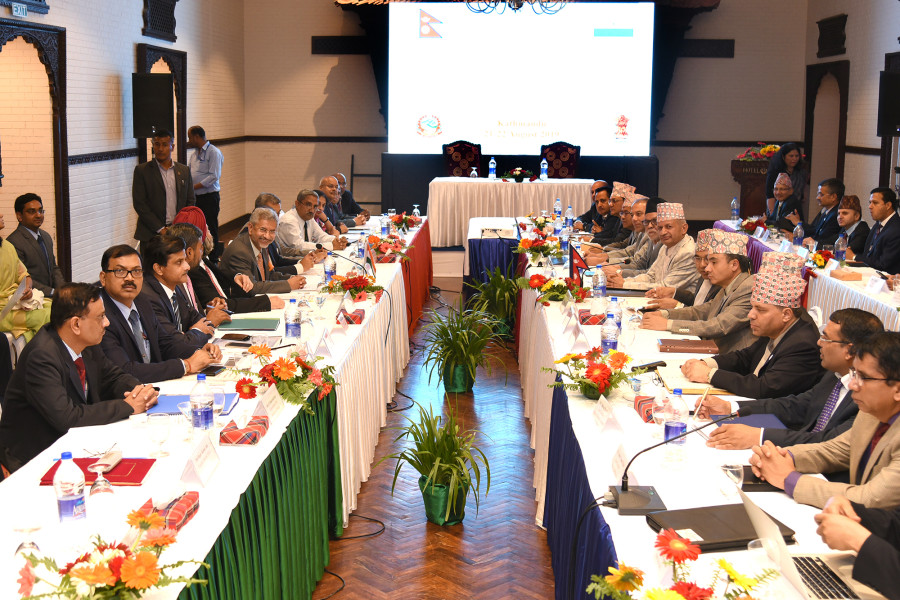Politics
As Nepal, India eye renewed ties, some irritants continue to persist
In his meetings, the Indian external affairs minister sought a clear Nepali position on Kashmir, but none was forthcoming.
Anil Giri
Indian External Affairs Minister S Jaishankar returned to New Delhi on Thursday with mixed results. Although Nepal and India agreed to chart out the broad terms in the next chapter of their bilateral relationship, there were specifics and a number of outstanding complaints.
During his two-day visit to Kathmandu, which was keenly observed by foreign policy analysts in Nepal, both sides agreed to chart out a future roadmap for a “comprehensive economic partnership”, according to Nepali officials.
But there were also expected grievances, from Prime Minister KP Sharma Oli to leaders from the ruling and opposition parties, including at the fifth meeting of the Nepal-India Joint Commission. Chief among them was the submission of the Eminent Persons’ Group report, which India has so far avoided receiving.
Jaishankar met with senior leaders from the major political parties but two former prime ministers—Pushpa Kamal Dahal and Madhav Kumar Nepal—declined to meet with him citing protocol. After a secretariat meeting at Baluwatar, Nepal had informed Dahal and Oli about a lunch meeting with Jaishankar at his hotel, but he was advised against the meeting. At the meeting, Dahal said that he was also invited for a meeting at Dwarika’s Hotel but he had refused, saying that he preferred to meet Jaishankar at his own residence. Nepal then cancelled his meeting, according to ruling party leaders.
However, two other former prime ministers—Sher Bahadur Deuba and Baburam Bhattarai—went to meet Jaishankar at his hotel with their respective deputies.
Contrary to general practice, the Indian side has not yet released any official statements or press communiqués regarding Jaishankar’s visit or the joint commission meeting, except for photos of his arrival in Kathmandu and his meetings with President Bidya Devi Bhandari, Oli and other leaders.
According to multiple political leaders and officials whom Jaishankar met on Wednesday and Thursday, the Indian minister refrained from commenting on Nepal’s internal politics but instead looked for a clear and specific position on Jammu and Kashmir, particularly in his meeting with Prime Minister Oli.
Two days before his arrival, Foreign Minister Pradeep Gyawali, during a press conference at the Foreign Ministry, had said that Nepal stands in favour of peace and stability in the region and that any dispute should be solved through dialogue. Oli responded to Jaishankar in the same spirit. Several officials with knowledge of the one-on-one meeting between Oli and Jaishankar told the Post that both leaders held a serious discussion over the unfolding situation in Kashmir, with Jaishankar pressing for a clearer position.
Apart from the Kashmir issue, another thorn in Jaishankar’s side was the Eminent Persons’ Group report. Gyawali, speaking in Parliament on Thursday, said that the joint commission meeting had agreed to instruct the respective foreign secretaries to come up with a concrete roadmap on a review of the 1950 Nepal-India Peace and Friendship Treaty, an issue that was taken up by the Eminent Persons’ Group. The EPG secretariat was also instructed to make necessary preparations to submit its report to the prime ministers of Nepal and India.
Rajan Bhattarai, the foreign relations advisor to Oli, said that the Nepali side believes that the report will be received soon. “This issue cannot be resolved in one meeting. They have to discuss it in New Delhi and find time for Prime Minister Narendra Modi to receive the report,” said Bhattarai.
However, in a meeting with Jaishankar, the six presidium members of the Rastriya Janata Party urged against consideration of the report as the group did not include adequate representation of Madhesis, the population that will be directly impacted by the report’s recommendations.
“The EPG prepared its report based on an open border, cultural relations, people-to-people relations, all of which are directly linked with us,” Rajkishor Yadav, current coordinator of the party, told the Post. “But we didn’t have any representation on the EPG, and our grievances weren’t heard either. So the report does not reflect the ground realities of the Madhes.”
The RPJ leaders also raised the issue of recurrent inundation and waterlogging in the Tarai during the monsoon and urged Jaishankar to help find a long-term solution.
The issue of inundation was discussed in the joint commission meeting and also came up in Jaishankar’s meeting with Nepali Congress leaders. According to a press statement issued by the Ministry of Foreign Affairs, both sides noted that inundation is a serious problem for people living in the border areas.
“The Joint Commission agreed to take action on the recommendations made by a joint team comprising officials from both sides who had visited the inundation prone areas along Nepal-India border twice and continue monitoring the inundation prone areas,” said the statement.
Sitting and former diplomats are of the opinion that Jaishankar’s visit unfolded as expected, but its results of his visit will only unfold in the days to come.
“This is the first high-level visit from India since the incumbent government was formed. We had a very productive and fruitful meeting,” said Nilamber Acharya, the Nepali ambassador to India. “We have made some commitments, and now we have to carry them forward.”
Bhekh Bahadur Thapa, a former Nepali ambassador to India and EPG coordinator from Nepal, was also cautiously optimistic about the outcome of Jaishankar’s visit.
“Some of the outcomes are positive. I do not see any negatives, but we have to see how these commitments will be translated into realities,” said Thapa.
Lokraj Baral, also a former Nepali ambassador to India, was much more circumspect.
“The prime minister held a one-on-one meeting with Jaishnakar for an hour, but we do not know what transpired between them,” said Baral. “We are not optimistic because unless we see the results, we cannot say any ice has been broken.”




 9.7°C Kathmandu
9.7°C Kathmandu














